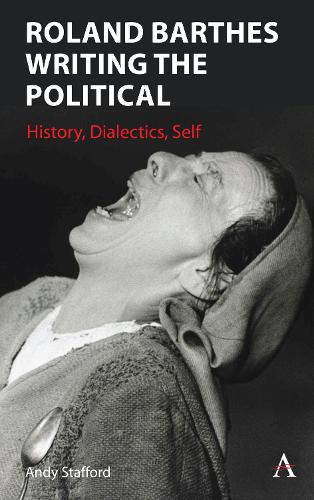
Roland Barthes Writing the Political: History, Dialectics, Self
(Hardback)
Publishing Details
Roland Barthes Writing the Political: History, Dialectics, Self
By (Author) Andrew Stafford
Anthem Press
Anthem Press
15th November 2022
United Kingdom
Classifications
Professional and Scholarly
Non Fiction
Politics and government
801.95
Physical Properties
Hardback
278
Width 153mm, Height 229mm, Spine 26mm
454g
Description
With typical rhetorical flourish and beholden to paradox, Roland Barthes defines his work on myth as an attempt to define things; and yet he is known foremost for his work on language. The aim of this book is to take things here as social relations, objects and other human beings with which the self interacts. It does so via language. And language in Barthess conception is double: alienating, alienated on the one side; liberating, inspiring on the other. It is this double that we investigate in this book: A spectre is haunting Barthes studies, the spectre of dialectics; and the spectral presence of dialectics is what we will define in this book as the Barthesian spirit, in both senses of the word, that is, haunting his analyses and, at once, providing us with a double approach. I have tried to define things, not words (Barthes 2009, 131n1).
Reviews
This book is daring yet meticulous intervention into the myth of an apolitical Barthes and aconvincing foregrounding of other spaces for critique to take place. This enables the authorto cast new light on a set of intertextual affinities between Barthes and Marx, therebyreinterpreting the formers work in the context of a uniquely Marxist materialism or theCapital of linguistics. What emerges is a new insight into the multiple significances ofBarthess preoccupation with paradox and dialectic.Fuhito Endo, Seikei University, Tokyo.
Stafford shatters a common assumption about Barthess writing. Against the grain of thedominant strain in Barthes scholarship that views him as an aesthete whose work haslittleto-no political dimension, Stafford convincingly demonstrates that the political is a keycomponent of his work. The aesthete is dead long live the political Barthes!Jeffrey R. DiLeo,Co-editor, Understanding Barthes, Understanding Modernism; Professor of English andPhilosophy, University of Houston, USA; Series editor, Anthem symploke Studies in Theory.
Stafford brilliantly bridges the gap between a Marxist Barthes debunking bourgeois mythsand a later hedonist by deploying a concept of un-dialectics thank to which his originalpolitical vision emerges, dialoguing with Lukacs, Goldmann, Thompson and Benjamin, avision attuned to todays preoccupations with tolerance, social justice and the question ofhow to live together. Jean-Michel Rabat,University of Pennsylvania, and American
Academy of Arts and Sciences, USA.
Author Bio
Renowned specialist of Roland Barthes, Andy Stafford has co-edited Barthess 19681969 seminar notes on Sarrasine. His work on Barthes is translated into Chinese, French and Portuguese.
